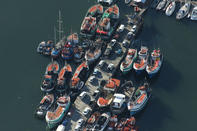Catch of the Day
South Africa has 2 500km of coastline. For some of us, the fish that comes out of these oceans is a significant part of both our culture and diet. The industry has also been an important part of the economy for many communities, Cape Town in particular.

Nonetheless, it’s an industry going through a difficult transition as ocean fish stocks drop, government reworks its policies around access to fishing quotas and small-scale fishers in particular feel marginalised in the process.
Some of the fishers on the Cape West Cast, such as those in Elandsbaai and Doringbaai, get up at 3am to head out to sea, and return at about 8am with a fresh catch. They’ll often stand at a traffic intersection or down on the beach all day, trying to sell their catch. Some days they’ll sell something; other days, nothing.
‘They tell us they need to sell their fish to buy veggies,’ says the Surplus People Project’s Zayaan Khan.
‘The idea of alternate economies could work for them. The fishers have fish, but they aren’t eating it daily. They aren’t getting vegetables, either. They could explore a system of exchange within the community of healthy localised food so they don’t need to go to the supermarket.’
Meanwhile right here in Cape Town, our snoek fisherman sell their catch from the back of bakkies because health and safety regulations make it hard to sell to the formal retailers, says UCT’s Dr Gareth Haysom. Some of these retailers are also selling imported snoek.